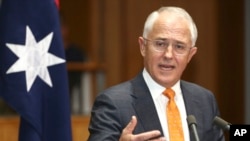Australian indigenous leaders say a government decision not to establish an official "voice" in parliament representing Aboriginal peoples is a “kick in the guts.”
Delegates at a landmark First Nation summit in May called on the Australian government to set up an indigenous body to guide and shape policy towards the country’s most disadvantaged people. Indigenous leaders wanted a constitutionally enshrined "voice" in parliament to help establish a path to a treaty between Aboriginal and non-Aboriginal Australians.
However, that idea has been rejected by the government. Prime Minster Malcolm Turnbull argued that an indigenous-only representative body would be seen as a third chamber of federal parliament in addition to the existing House of Representatives and Senate.
Turnbull said most Australians were unlikely to support such a body in a national referendum because it clashed with the notion of equal rights for all.
But Indigenous leaders feel let down, and say the government’s decision was a “kick in the guts.”
Greens party leader, Senator Richard Di Natale says Australia’s original inhabitants deserve a voice within the nation’s parliament.
“They want to be front and center in decision-making, and that is not a big ask. Do not do things for us, do them with us," said Di Natale. "We need to make sure that there is a strong Aboriginal voice represented in the Australian parliament at the heart of decision-making.”
Aboriginal Australians make up about three per cent of the national population. They suffer disproportionately high rates of poverty, unemployment and imprisonment.
It has been almost a decade since federal and state governments in Australia began a concerted effort to improve health, education and employment in indigenous communities, but there has been limited progress in key areas.










